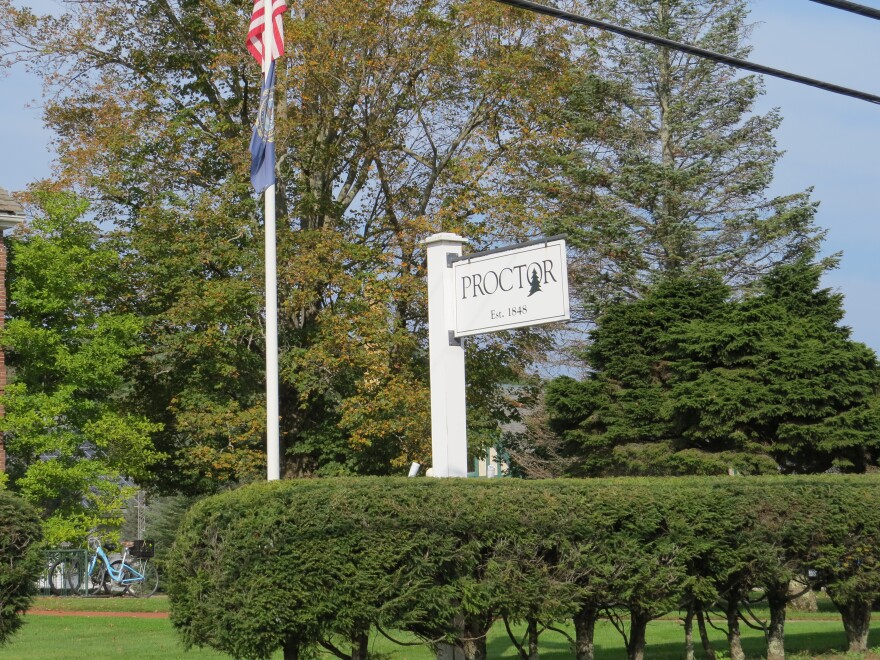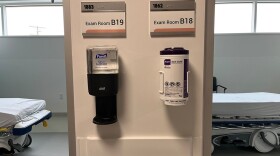An external investigation has found that seven former Proctor Academy employees engaged in sexual misconduct with students, with much of the conduct occurring in the 1980s.
Investigators said they substantiated an allegation that a former faculty member, Michael Graham, drugged and sexually assaulted a female student. They also determined that Graham and other staff members engaged in a range of inappropriate behavior, including forming romantic and sexual relationships with current or recently-graduated students.
Besides Graham, none of the staff were named. Graham declined investigators’ request for an interview and could not be reached by the Monitor. He left Proctor in 1983, but received a positive letter from then-Head of School David Fowler upon his departure, according to the report.
Proctor, a private co-ed high school in Andover with almost 400 students, initiated the independent investigation last May after receiving a sexual misconduct report from a graduate.
“The cultural norms of the 1970s and 1980s that were present at Proctor and accepted by its leadership created an environment where boundaries were blurred,” Travis Warren, the school board president, and Melanie Sanford, the chair of its committee on sexual misconduct, wrote in a joint letter included with the report, which was released to the community this week.
“We recognize there have been times in our past when individuals took advantage of their roles while at Proctor,” they wrote. “We are profoundly sorry to those harmed by these situations, and we are striving to take accountability for Proctor’s role in these situations.”
The report described a period in which it was common for staff to invite students to their on-campus residences, drink alcohol with them at parties, and spend time together one-on-one.
“Faculty and administrators from that time stated that these behaviors, while clearly inappropriate and boundary-crossing, were typical of many Proctor faculty-student relationships in the 1980s which were described as ‘more laissez-faire in terms of closeness’ and therefore ‘[n]o one thought anything of it’,” investigators from the Maine-based law firm, Aleta Law, wrote in their report.

While almost all of the substantiated misconduct occurred in the 1980s, two of the faculty members left Proctor within the past five years. One resigned following an internal investigation into his conduct, according to the report, and the other left voluntarily, according to Scott Allenby, the school’s Chief Strategy and Communications Officer.
Investigators found that in most cases, the school “did not take appropriate actions in response to available information” about the misconduct at the time it occurred.
Allenby said Proctor has shared the report with the Andover Police Department and is working to ensure compliance with mandatory reporting laws.
The police department did not respond to a request for comment and it was not clear whether any of the misconduct – which primarily occurred in the 1980s, but extended to the 2010s in one instance – would fall within statutes of limitations for criminal violations.
The wide-ranging investigation involved interviews with 42 people, including four of the seven former employees. All of them acknowledged that they engaged in at least some of the behavior described by the former students.
The investigators chose to name Graham but not the other six people based on a five-factor test that took into account the strength of the evidence, the number of reports, the severity of the conduct, ongoing community risk, and the effect on the former students who reported the misconduct.
In all, 14 students reported sexual misconduct, with some reporting conduct perpetrated by multiple employees and four reporting conduct by students or alumni, rather than teachers. Investigators were unable to substantiate allegations against six additional faculty members and did not formally investigate the claims against the students or former students.
Investigators relied on employment records and interviews with current and former employees, including current Interim Head of School Steve Wilkins, who also served as the school leader from 1995 to 2005.
The substantiated misconduct was wide-ranging.
Three students accused Graham, an English teacher and coach, of sexual touching and assault, while several others reported he had a sexual relationship with a fourth student, who did not come forward to investigators. One of the students told investigators that she went over to Graham’s apartment a week after graduating from Proctor in the 1980s and Graham handed her a beer. She said she believed “the beer was probably messed with because there was a blackout,” and the next thing she recalled was awaking “naked” next to Graham as he assaulted her.
She did not report the assault to anyone at that time but did reach out to Graham about 10 years later, she said. When she called him, he stated, “Nice to speak to you. I don’t ever want to talk to you again. Proctor is not part of my life,” and then hung up, according to the report.
Investigators found another faculty member, who also worked as an athletic trainer, had inappropriately touched students under his care. He is no longer alive.
A third faculty member admitted to confessing he had “romantic feelings for” a student in an empty locker room in the 1990s. The student told investigators that she immediately reported it to an administrator, who told her to “just ignore” him. The faculty member told investigators that what he did was “wrong” and that he “regret[s] it.”
A fourth admitted that he began a sexual relationship with a student and left his wife for her weeks after she graduated in the 1980s.
The most recent substantiated misconduct, which occurred in the 2010s, involved a faculty member asking a recently graduated student to send him a nude photo of herself.
In response to the revelations, Proctor has partnered with the organization Learning Courage to support “sexual misconduct prevention and trauma-informed responses”, Wilkins said in a statement.
“Throughout the process of the investigation into mostly decades old allegations of misconduct, we have sought to acknowledge any harm that was done, apologize to survivors, support healing within the community, and ensure we are doing all we can to provide a safe, caring, and healthy environment for our current and future students,” Wilkins, the interim school leader, said. “We acknowledge the strength and courage of the survivors who have come forward and thank them for their willingness to share their experiences.”
The school has initiated a range of changes to its policies and practices, which involve enhanced training, an annual review, and the retention of an attorney who specializes in “trauma-informed investigations.”
The school’s board is encouraging any members of the Proctor community with additional misconduct information to reach out to either Aleta Law or the Learning Courage organization.
Jeremy Margolis can be contacted at jmargolis@cmonitor.com.
These articles are being shared by partners in the Granite State News Collaborative. For more information, visit collaborativenh.org.







